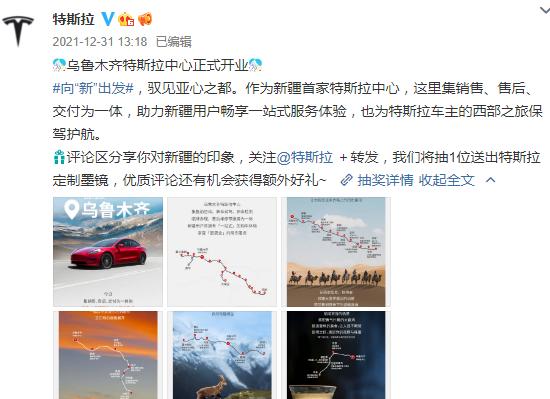
▲On December 31, 2021, the Tesla Center in Urumqi was officially opened. Photo/ Tesla's official Weibo
On the last day of 2021, Tesla announced on its official Weibo that the first Tesla center set up in Xinjiang was officially opened. However, this news has aroused a lot of opposition in the United States, and various groups have accused Tesla of "supporting genocide".
Opening a Tesla center in Xinjiang is an extension and development of Tesla's business in China, and it is also a choice for its electric vehicle business to achieve effective docking and optimal allocation of resources with Xinjiang's photovoltaic industry, which is completely a manifestation of the spontaneous order of the market and has nothing to do with race or politics.
Today, the industrial and market systems between China and the United States are deeply nested, as exemplified by the expansion of Tesla's business in China. Under the influence of the "decoupling from China" in the United States and the new crown epidemic, the Chinese market is second only to the North American market, contributing about one-third of the share. Obviously, the deep nesting between the Chinese and American economies provides a powerful "antibody" for American companies such as Tesla to do business in China.
Tesla has opened dozens of Tesla centers in China, providing sales, after-sales, delivery and other services, Xinjiang's electric vehicle market is growing rapidly, Tesla set up a service center here, it is completely a commercial act, why has it triggered opposition from the US government and religious groups?
▲Infographic. Photo/ Tesla official website
A big reason is that late last year, US President Joe Biden signed the so-called Uyghur Forced Labor Prevention Act, which prohibits U.S. companies and individual entities from importing any Xinjiang-made products. Unlike the general law, the bill is based on the "presumption of guilt," which means that companies or individuals must prove that the goods they sell or buy do not contain ingredients from Xinjiang. This means that the United States believes that all products produced in Xinjiang are related to "forced labor" and to so-called "genocide".
In fact, even under the U.S. government's bill, Tesla's sales of electric vehicles in Xinjiang did not violate the law. In response, the White House National Security Council said in a statement that it would not comment on the behavior of a company, but generally believed that the private sector should oppose China's policy in Xinjiang. This official "no comment" attitude is actually a tacit acquiescence to Tesla's failure to violate the bill. Moreover, if it is violated, Tesla may not face such a vague statement from the government.
However, according to its own development needs, Tesla still does not hesitate to "get involved" with Xinjiang after the United States has signed the Xinjiang-related bill, which will inevitably cause some anti-China politicians and groups in the United States to be uneasy and worried. Their impatient jump out to blame Tesla also proves to some extent the absurdity and powerlessness of the so-called Uyghur Forced Labor Prevention Act.
The fundamental goal of the United States in signing this bill is to strike at Xinjiang's economic development through absurd political pretexts, remove Xinjiang from the global industrial chain, and then attack China's related industries.
Under the banner of "human rights" and "democracy," the United States occupies the so-called moral high ground, but its goal is industry. Since the Biden administration took office, the increasingly clear outline of a series of policy operations is that strategic industrial competition with China has become a top priority, including continuously attracting Taiwan to join the US-led semiconductor industry, as well as a bill for Xinjiang, the core goal is to cut off the increasingly dense industrial chain network between China and the United States.
Tesla's "bucking the trend" based on market choices is actually a "spoiler" for the Biden administration to "hard decouple" politically.
Therefore, the bill against Xinjiang promoted by the US government not only has no factual basis, but also has no legal enforceability. Xinjiang's industry and development are not only deeply nested in China's economic system, but also a key node in the global industrial chain network. The United States enacted a bill to restrain private enterprises on trumped-up charges, doomed to futile efforts. The accusations that Tesla faces are purely the result of the US government politicizing and security economic issues, and eventually the US government will suffer its own consequences.
Beijing News special writer | Sun Xingjie (Professor, Deputy Director, Institute of International Relations, Jilin University)
Edit | Chi Daohua
Proofreading | Wu Xingfa